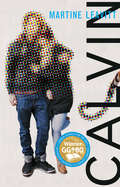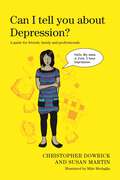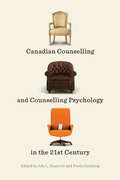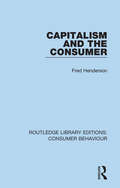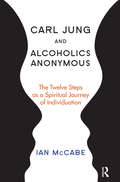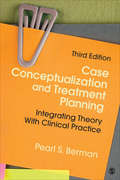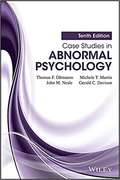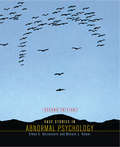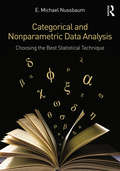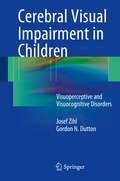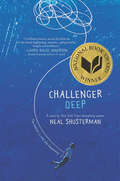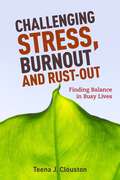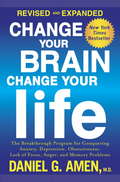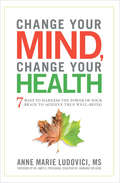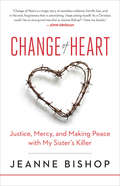- Table View
- List View
Calvin: Just Because You See Something Doesn't Mean It's Really There
by Martine LeavittWinner of the 2016 Governor General's Literary Award for Young People's Literature — TextIn the town of Leamington, Ontario, a seventeen-year-old boy is suddenly stricken by a schizophrenic episode and wakes up in hospital. The boy’s name is Calvin, and he is plagued by hallucinations.As the hallucinations persist, Calvin comes to believe that the answer lies in performing one grand and incredible gesture.And so he decides to walk across Lake Erie. In January. The temperatures have been below freezing for weeks. The ice should hold…The lake, it turns out, is more marvelous, and more treacherous, than Calvin had ever imagined — populated by abandoned cars (joy ride!), ice-fishing eccentrics, psychokiller snow beings, and a not-so-mythical sea witch named Jenny Greenteeth.Not to mention the man-eating tiger that looms just out of his sight lines as he treks.But the biggest surprise of all is that Calvin finds himself accompanied by Susie, the girl of his dreams. Or is it his dreams that have conjured up Susie?Part romance, part adventure story, part quest novel, Martine Leavitt brings her inimitable gentle wit, humor and compassion to a story about a teenaged boy struggling to gain control of his own mind and destiny.
Cambridge Approaches to Language Contact: The Emergence of Hybrid Grammars
by Enoch Oladé AbohChildren are extremely gifted in acquiring their native languages, but languages nevertheless change over time. Why does this paradox exist? In this study of creole languages, Enoch Aboh addresses this question, arguing that language acquisition requires contact between different linguistic sub-systems that feed into the hybrid grammars that learners develop. There is no qualitative difference between a child learning their language in a multilingual environment and a child raised in a monolingual environment. In both situations, children learn to master multiple linguistic sub-systems that are in contact and may be combined to produce new variants. These new variants are part of the inputs for subsequent learners. Contributing to the debate on language acquisition and change, Aboh shows that language learning is always imperfect: learners' motivation is not to replicate the target language faithfully but to develop a system close enough to the target that guarantees successful communication and group membership.
Cambridge Companions to Management: Mindfulness in Organizations:
by Jochen RebMindfulness techniques, having long played an important role in contemplative traditions around the world, are now recognized as having the potential to transform workplaces. As interest in the role of mindfulness in organizational settings continues to increase, this timely book fills a gap in the literature by providing an overview of the latest theoretical and empirical research on workplace mindfulness. It brings together world-leading scholars to explore the foundations, key discussions, diversity of approaches and applications of mindfulness in organizations. It acts as a catalyst for future research on the topic by suggesting research directions and stimulating organizational researchers to embark on new projects involving mindfulness. Furthermore, it provides valuable ideas for implementing mindfulness programs in organizations, for teaching mindfulness in business contexts, and for coaching with mindfulness. This must-read book will appeal to researchers and professionals in the fields of organizational behavior, organizational psychology and employee well-being.
Cambridge Handbooks in Language and Linguistics: The Cambridge Handbook of Bilingual Processing
by John W. SchwieterHow does a human acquire, comprehend, produce and control multiple languages with just the power of one mind? What are the cognitive consequences of being a bilingual? These are just a few of the intriguing questions at the core of studying bilingualism from psycholinguistic and neurocognitive perspectives. Bringing together some of the world's leading experts in bilingualism, cognitive psychology and language acquisition, The Cambridge Handbook of Bilingual Processing explores these questions by presenting a clear overview of current theories and findings in bilingual processing. This comprehensive handbook is organized around overarching thematic areas including theories and methodologies, acquisition and development, comprehension and representation, production, control, and the cognitive consequences of bilingualism. The handbook serves as an informative overview for researchers interested in cognitive bilingualism and the logic of theoretical and experimental approaches to language science. It also functions as an instrumental source of readings for anyone interested in bilingual processing.
Cambridge Handbooks in Language and Linguistics: The Cambridge Handbook of Child Language
by Bavin, Edith L. and Naigles, Letitia R. Edith L. Bavin Letitia R. NaiglesThe most authoritative resource for students and researchers, The Cambridge Handbook of Child Language has been thoroughly updated and extended. Enhancements include new chapters on the acquisition of words, processing deficits in children with specific language impairments, and language in children with Williams syndrome, new authors for the bilingualism and autism chapters, a refocused discourse chapter on written narratives, and a new section on reading and reading disorders, cementing the handbook's position as the best study of the subject available. In a wide-ranging survey, language development is traced from prelinguistic infancy to adolescence in typical and atypical contexts; the material is intuitively grouped into six thematic sections, enabling readers to easily find specific in-depth information. With topics as varied as statistical learning, bilingualism, and the neurobiology of reading disorders, this multidisciplinary Handbook is an essential reference for students and researchers in linguistics, psychology, cognitive science, speech pathology, education and anthropology.
Cambridge Handbooks in Language and Linguistics: The Cambridge Handbook of Learner Corpus Research
by Sylviane GrangerThe origins of learner corpus research go back to the late 1980s when large electronic collections of written or spoken data started to be collected from foreign/second language learners, with a view to advancing our understanding of the mechanisms of second language acquisition and developing tailor-made pedagogical tools. Engaging with the interdisciplinary nature of this fast-growing field, The Cambridge Handbook of Learner Corpus Research explores the diverse and extensive applications of learner corpora, with 27 chapters written by internationally renowned experts. This comprehensive work is a vital resource for students, teachers and researchers, offering fresh perspectives and a unique overview of the field. With representative studies in each chapter which provide an essential guide on how to conduct learner corpus research in a wide range of areas, this work is a cutting-edge account of learner corpus collection, annotation, methodology, theory, analysis and applications.
Can I tell you about Depression?: A guide for friends, family and professionals
by Susan Martin Christopher Dowrick Mike MedagliaPart of the Reading Well scheme. 35 books selected by young people and health professionals to provide 13 to 18 year olds with high-quality support, information and advice about common mental health issues and related conditions. Meet Julie - a women who suffers from periods of depression. Julie and her family help readers to understand what depression is, what it is like to feel depressed and how it can affect their family life. She explains how coping with depression can sometimes be very difficult but there is support and help available that can relieve the feelings of depression. This illustrated book is an ideal introduction to depression - a condition that can be particularly difficult for children to understand. It is suitable for readers aged 7 upwards and shows family, friends and anyone who knows someone affected by depression how they can offer support.
Can't Talk, Want to Talk!
by Jo Levett Stephen StreetWhen outgoing Lily meets a little girl who is too afraid to talk in school or other places outside of her home, she befriends the silent girl, their friendship grows, and the silent girl feels comfortable enough to talk to her new friend. This beautifully illustrated story book is for children with selective mutism to see that they can make a friend like Lily. It is also a helpful tool for parents, friends and teachers of children with selective mutism to understand why these children are unable to talk in certain settings, and to explore some strategies that may help reduce their anxiety around speaking. Jo studied for a Masters Degree in Speech and Language Sciences and qualified as a Speech and Language Therapist at University College London in 2006. Since then she has worked with children in a range of home, clinic and educational settings and currently combines NHS and independent work.
Canadian Counselling and Counselling Psychology in the 21st Century
by Ada L. Sinacore Freda GinsbergCanadian counsellors and counselling psychologists have made significant advances in mental health services and the broader field of applied psychology, but much of the counselling and counselling psychology scholarship has been published outside of Canada, rendering it difficult to identify as distinctly Canadian. This path-breaking book highlights the work of Canadian counsellors and counselling psychologists and focuses on issues pertinent to practising in Canada. Key topics such as scientific issues, health, wellness, prevention, career psychology, assessment, training and supervision, and social justice and multiculturalism are explored in detail. Using a strength-based framework, each chapter attends to societal factors, diversity of methodological frameworks, and an analysis of the challenges and future directions for the disciplines. Providing a common voice for a diverse group of students and professionals, Canadian Counselling and Counselling Psychology in the 21st Century will be of interest to counsellor educators, faculty in counsellor and counselling psychology training programs, and counsellors interested in advancing their understanding of the current state of the field. Contributors include Kevin G. Alderson (University of Calgary), Nancy Arthur (University of Calgary), Bill Borgen (University of British Columbia), Marla Buchanan (University of British Columbia), Erin Buhr (Trinity Western University), Lee Butterfield (Adler School of Professional Psychology), Sharon Cairns (University of Calgary), Sandra Collins (Athabasca University), Jose Domene (University of New Brunswick), Marilyn Fitzpatrick (McGill University), Nick Gazzola (University of Ottawa), Freda Ginsberg (SUNY Plattsburgh), Liette Goyer (Universite Laval), Bryan Hiebert (University of Victoria), George Hurley (Memorial University of Newfoundland), Anusha Kassan (University of British Columbia), Patricia Keats (Simon Frazer University), Audrey Kinzel (University of Saskatoon), Vivian Lalande (University of Calgary, Sasha Lerner (McGill University), Anne Marshall (University of Victoria), Marv McDonald (Trinity Western University), Louise Overington (McGill University), Jane M. Oxenbury (Independent Practice), Sharon Robertson (University of Calgary), Ada L. Sinacore (McGill University), Suzanne L. Stewart (OISE, University of Toronto), and Jessica Van Vliet (University of Alberta).
Canadian Counselling and Counselling Psychology in the 21st Century
by Ada L. Sinacore Freda GinsbergCanadian counsellors and counselling psychologists have made significant advances in mental health services and the broader field of applied psychology, but much of the counselling and counselling psychology scholarship has been published outside of Canada, rendering it difficult to identify as distinctly Canadian. This path-breaking book highlights the work of Canadian counsellors and counselling psychologists and focuses on issues pertinent to practising in Canada. Key topics such as scientific issues, health, wellness, prevention, career psychology, assessment, training and supervision, and social justice and multiculturalism are explored in detail. Using a strength-based framework, each chapter attends to societal factors, diversity of methodological frameworks, and an analysis of the challenges and future directions for the disciplines. Providing a common voice for a diverse group of students and professionals, Canadian Counselling and Counselling Psychology in the 21st Century will be of interest to counsellor educators, faculty in counsellor and counselling psychology training programs, and counsellors interested in advancing their understanding of the current state of the field. Contributors include Kevin G. Alderson (University of Calgary), Nancy Arthur (University of Calgary), Bill Borgen (University of British Columbia), Marla Buchanan (University of British Columbia), Erin Buhr (Trinity Western University), Lee Butterfield (Adler School of Professional Psychology), Sharon Cairns (University of Calgary), Sandra Collins (Athabasca University), Jose Domene (University of New Brunswick), Marilyn Fitzpatrick (McGill University), Nick Gazzola (University of Ottawa), Freda Ginsberg (SUNY Plattsburgh), Liette Goyer (Universite Laval), Bryan Hiebert (University of Victoria), George Hurley (Memorial University of Newfoundland), Anusha Kassan (University of British Columbia), Patricia Keats (Simon Frazer University), Audrey Kinzel (University of Saskatoon), Vivian Lalande (University of Calgary, Sasha Lerner (McGill University), Anne Marshall (University of Victoria), Marv McDonald (Trinity Western University), Louise Overington (McGill University), Jane M. Oxenbury (Independent Practice), Sharon Robertson (University of Calgary), Ada L. Sinacore (McGill University), Suzanne L. Stewart (OISE, University of Toronto), and Jessica Van Vliet (University of Alberta).
Capitalism and the Consumer (Routledge Library Editions: Consumer Behaviour)
by Fred HendersonWritten at a time when the needs and influence of the consumer within the economic system were in their infancy, this book offers a valuable insight into the birth of consumer-led economics as an integral part of social structure and economic theory.
Carl Jung and Alcoholics Anonymous: The Twelve Steps as a Spiritual Journey of Individuation
by Ian McCabeThe author visited the archives of the headquarters of A.A. in New York, and discovered new communications between Carl Jung and Bill Wilson. For the first time this correspondence shows Jung's respect for A.A. and in turn, its influence on him. In particular, this research shows how Bill Wilson was encouraged by Jung's writings to promote the spiritual aspect of recovery as opposed to the conventional medical model which has failed so abysmally. The book overturns the long-held belief that Jung distrusted groups. Indeed, influenced by A.A.'s success, Jung gave "complete and detailed instructions" on how the A.A. group format could be developed further and used by "general neurotics".Wilson was an advocate of treating some alcoholics with LSD in order to deflate the ego and induce a spiritual experience. The author explains how alcoholism can be diagnosed and understood by professionals and the lay person; by examining the detailed case histories of Jung, the author gives graphic examples of its psychological and behavioural manifestations.
Case Conceptualization and Treatment Planning: Integrating Theory With Clinical Practice
by Dr Pearl Susan BermanUsing compelling client interviews and skill-building exercises, this practical book shows students how to tailor clinical work to the specific background of a client using any theoretical perspective. Thoroughly revised and expanded, the Third Edition of Case Conceptualization and Treatment Planning, by Pearl S. Berman, adds two new theoretical orientations (cultural therapy and the cognitive-behavioral model) and includes exercises for expanding student self-awareness of personal biases.
Case Conceptualization and Treatment Planning: Integrating Theory With Clinical Practice
by Dr Pearl Susan BermanUsing compelling client interviews and skill-building exercises, this practical book shows students how to tailor clinical work to the specific background of a client using any theoretical perspective. Thoroughly revised and expanded, the Third Edition of Case Conceptualization and Treatment Planning, by Pearl S. Berman, adds two new theoretical orientations (cultural therapy and the cognitive-behavioral model) and includes exercises for expanding student self-awareness of personal biases.
Case Studies In Abnormal Psychology
by John M. Neale Gerald C. Davison Thomas F. Oltmanns Michele T. MartinCase Studies in Abnormal Psychology, 10th Edition takes mental disorders from the realm of theory into the complex reality of human lives. This casebook presents comprehensive coverage of 23 high interest cases that include topics such as eating disorders, gender identity disorder, borderline personality, and posttraumatic stress disorder. Each study (1) provides detailed descriptions of a range of clinical problems, (2) illustrates some of the ways in which these problems can be viewed and treated, and (3) discusses some of the evidence that is available concerning the prevalence and causes of the disorders in question.
Case Studies in Abnormal Psychology
by Ronald J. Comer Ethan E. GorensteinFully updated for DSM-5, this exciting revision complements the abnormal psychology course by providing 17 case histories based on the authors' clinical experiences Each case study goes beyond DSM-5 diagnosis to describe the individual's history and symptoms, a theoretical discussion of treatment, a specific treatment plan, the actual treatment conducted, and assessment questions for students. The casebook also provides three "You Decide" cases -- written without diagnosis or treatment, so students can identify disorders and suggest appropriate therapies This new edition adds assessment questions to the end of each case and also features three brand new cases: hoarding, somatic symptom disorder, and gender dysphoria.
Casebook of Evidence-Based Therapy for Eating Disorders
by Heather Thompson-BrennerIllustrating the "whats," "whys," and "how-tos" of the leading evidence-based treatments for eating disorders, this unique volume is organized around in-depth cases. A range of therapies are represented in sections covering behavioral, cognitive, affect-based, relational, and integrative approaches. Each section opens with an instructive overview by the editor. The expert contributors show what their techniques look like in action with patients struggling with anorexia nervosa, bulimia nervosa, binge-eating disorder, and related problems. Cases cover the entire process of treatment and include therapist-patient dialogues. The essential role of assessment in treatment planning and progress monitoring is highlighted, with detailed descriptions of relevant instruments and procedures.
Categorical and Nonparametric Data Analysis: Choosing the Best Statistical Technique (Multivariate Applications Series)
by E. Michael NussbaumFeaturing in-depth coverage of categorical and nonparametric statistics, this book provides a conceptual framework for choosing the most appropriate type of test in various research scenarios. Class tested at the University of Nevada, the book's clear explanations of the underlying assumptions, computer simulations, and Exploring the Concept boxes help reduce reader anxiety. Problems inspired by actual studies provide meaningful illustrations of the techniques. The underlying assumptions of each test and the factors that impact validity and statistical power are reviewed so readers can explain their assumptions and how tests work in future publications. Numerous examples from psychology, education, and other social sciences demonstrate varied applications of the material. Basic statistics and probability are reviewed for those who need a refresher. Mathematical derivations are placed in optional appendices for those interested in this detailed coverage. Highlights include the following: Unique coverage of categorical and nonparametric statistics better prepares readers to select the best technique for their particular research project; however, some chapters can be omitted entirely if preferred. Step-by-step examples of each test help readers see how the material is applied in a variety of disciplines. Although the book can be used with any program, examples of how to use the tests in SPSS and Excel foster conceptual understanding. Exploring the Concept boxes integrated throughout prompt students to review key material and draw links between the concepts to deepen understanding. Problems in each chapter help readers test their understanding of the material. Emphasis on selecting tests that maximize power helps readers avoid "marginally" significant results. Website (www.routledge.com/9781138787827) features datasets for the book's examples and problems, and for the instructor, PowerPoint slides, sample syllabi, answers to the even-numbered problems, and Excel data sets for lecture purposes. Intended for individual or combined graduate or advanced undergraduate courses in categorical and nonparametric data analysis, cross-classified data analysis, advanced statistics and/or quantitative techniques taught in psychology, education, human development, sociology, political science, and other social and life sciences, the book also appeals to researchers in these disciplines. The nonparametric chapters can be deleted if preferred. Prerequisites include knowledge of t tests and ANOVA.
Cerebral Visual Impairment in Children: Visuoperceptive and Visuocognitive Disorders
by Gordon N. Dutton Josef ZihlCerebral visual disorders have far-reaching consequences for child development. These have profound adverse effects on children's education and success in school and also in later life, but, unfortunately, cerebral visual disorders often remain undiagnosed and untreated in the pediatric population. This book provides a state-of-the-art account of what is known about the development and disorders of visual perception in children. It covers the development and disorders of visual perception in children, their assessment, early intervention and management in an interdisciplinary context, both from a scientific as well as clinical perspective. Case studies illustrate the recommended assessment and rehabilitation procedures; synopses, boxes and check-lists complement the presentation of our recommendations for clinical practice.
Challenger Deep
by Neal Shusterman Brendan ShustermanA captivating novel about mental illness that lingers long beyond the last page, Challenger Deep is a heartfelt tour de force by New York Times bestselling author Neal Shusterman.<P><P> Caden Bosch is on a ship that's headed for the deepest point on Earth: Challenger Deep, the southern part of the Marianas Trench.<P> Caden Bosch is a brilliant high school student whose friends are starting to notice his odd behavior.<P> Caden Bosch is designated the ship's artist in residence to document the journey with images.<P> Caden Bosch pretends to join the school track team but spends his days walking for miles, absorbed by the thoughts in his head.<P> Caden Bosch is split between his allegiance to the captain and the allure of mutiny.<P> Caden Bosch is torn.<P> Challenger Deep is a deeply powerful and personal novel from one of today's most admired writers for teens.<P> Winner of the National Book Award
Challenging Stress, Burnout and Rust-Out: Finding Balance in Busy Lives
by Teena J. CloustonA balanced lifestyle enhances health, happiness and wellbeing. With practical techniques and strategies, this book explores how this balance can be found and how stress and anxiety, which are linked to being overworked and over busy, may be alleviated. It begins by examining the state of work-life imbalance in our everyday lives and discussing real life examples from a group of professionals working in health and social care. Their stories and experiences illustrate the problems caused by our modern, work-driven society and resonate with how many of us are living today. The author then provides practical tools and techniques to address this overwork culture and achieve a more balanced lifestyle. These simple, yet effective, strategies can be implemented quickly in everyday life. This practical resource addresses a problem affecting many professionals worldwide. It will be of particular interest to helping professionals, including occupational therapists, counsellors and therapists, and will allow them to apply the theories of work-life balance to real life in straightforward and tangible ways. The stories and techniques will also resonate with anyone interested in transforming their overworked or overburdened lives.
Change Your Brain, Change Your Life (Revised and Expanded)
by Daniel G. AmenIn this completely revised and updated edition of the breakthrough bestseller, you'll see scientific evidence that your anxiety, depression, anger, obsessiveness, or impulsiveness could be related to how specific structures in your brain work. You're not stuck with the brain you're born with. Renowned neuropsychiatrist Dr. Daniel Amen includes cutting-edge reseach and the latest surprising, effective "brain prescriptions" that can help heal your brain and change your life:To quell anxiety and panic:Use simple breathing techniques to immediately calm inner turmoilTo fight depression: Learn how to kill ANTs (automatic negative thoughts)To curb anger:Follow the Amen anti-anger diet and learn the nutrients that calm rageTo conquer impulsiveness and learn to focus:Develop total focus with the One-Page MiracleTo stop obsessive worrying:Follow the "get unstuck" writing exercise and learn other problem-solving exercises
Change Your Brain, Change Your Life (Revised and Expanded): The Breakthrough Program for Conquering Anxiety, Depression, Obsessiveness, Lack of Focus, Anger, and Memory Problems
by Daniel G. AmenIn this completely revised and updated edition of the breakthrough bestseller, you'll see scientific evidence that your anxiety, depression, anger, obsessiveness, or impulsiveness could be related to how specific structures in your brain work. You're not stuck with the brain you're born with. Renowned neuropsychiatrist Dr. Daniel Amen includes cutting-edge reseach and the latest surprising, effective "brain prescriptions" that can help heal your brain and change your life:To quell anxiety and panic:Use simple breathing techniques to immediately calm inner turmoilTo fight depression: Learn how to kill ANTs (automatic negative thoughts)To curb anger:Follow the Amen anti-anger diet and learn the nutrients that calm rageTo conquer impulsiveness and learn to focus:Develop total focus with the One-Page MiracleTo stop obsessive worrying:Follow the "get unstuck" writing exercise and learn other problem-solving exercises
Change Your Mind, Change Your Health: 7 Ways to Harness the Power of Your Brain to Achieve True Well-Being
by Anne Marie Ludovici&“Easy to relate to and fun to read, with sensible advice that doesn&’t require anything but a desire to be healthy.&”—Ken Blanchard, coauthor of The One Minute Manager® True wellness is about more than just health—it&’s about living a fulfilling, well-rounded life. It&’s about becoming and being our best selves. Yet from health to jobs to finances, it&’s no secret that people today face a number of seemingly insurmountable barriers to achieving a secure, self-affirming sense of personal well-being. They&’ve tried fad-this and celebrity-that because they want to change, but nothing really works or lasts. Without knowing how to achieve meaningful and sustainable personal change, many of us lack the independence and empowerment to make it happen. Filled with personal, engaging stories, Change Your Mind, Change Your Health reveals proven techniques used by behavioral experts, researchers, health coaches, and psychology professionals to inspire and empower people to embrace the enriching power of change. Change isn&’t an outcome, it&’s a process—a journey of personal independence, self-discovery, and transformation leading to a new, healthier you. Change Your Mind, Change Your Health leads you step-by-step down the path to conquer your challenges and harness and channel your inner power to transform your life for good. Just as the caterpillar becomes a butterfly, the power of change can unlock your hidden beauty and potential to soar. &“You are in the hands of one of my favorite friends and colleagues in the wellness field.&”—James O. Prochaska, PhD, coauthor of Changing for Good &“An excellent resource for anyone seeking permanent health behavior change.&”—Kathleen Cullinen, PhD, RD, executive committee for the Academy of Nutrition and Dietetics
Change of Heart: Justice, Mercy, and Making Peace with My Sister’s Killer
by Jeanne BishopThis powerful, true story of faith and forgiveness shows that all of us are capable of experiencing the healing and renewal that comes with truly forgiving another. Change of Heart follows the transformative journey undertaken by Jeanne Bishop after the murders of her sister and brother-in-law, a journey that challenged Jeanne's belief in the message of Jesus on the cross and eventually moved her beyond simple forgiveness to the deeper waters of redemption and grace. Jeanne's authentic story will guide readers past the temptation of anger and revenge, and help them navigate the path of truly forgiving someone whose actions have hardened their heart. From once wishing that her sister's killer languished in a cell for the rest of his life, Jeanne now visits him regularly in prison and publicly advocates for his release. "It's not okay what you did, but I am not going to hate you. I am not going to wish evil on you," writes Bishop of the murderer. "I am going to wish the opposite. I am going to wish that you will be redeemed. " "The criminal justice system in the United States, which deems some people unworthy of redemption--even children who commit serious crimes--urgently needs to hear voices that speak for mercy and restoration. Jeanne Bishop's is such a voice" writes Sr. Helen Prejean, activist and author of Dead Man Walking. Change of Heart confronts these serious and pressing issues of restorative justice, juvenile life sentences, and incarceration in the criminal justice system. Ultimately, Jeanne is writing more than a memoir of finding faith through extraordinary obstacles. Her compelling story offers a better understanding of what it truly means to be a person of faith. It is a call to action that is a "must-read for pastors, social workers, caregivers, and all who seek to build community with people relegated to the margins" (Greg Ellison, Emory University).
